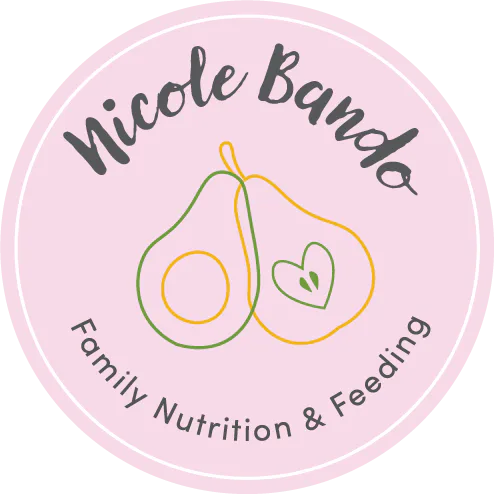
WEIGHT LOSS AFTER PREGNANCY
There is a lot of pressure from society on women to ‘bounce back’ to their pre-pregnancy weight, however, this is not realistic nor recommended. Some of the weight gained during pregnancy is used to fuel breastfeeding, which is why breastfeeding can help a woman gradually return to her pre-pregnancy weight. Weight loss is recommended at the rate of around 2kg loss per month, as this does not affect breast milk production. It takes 9 months to grow a baby, so it is expected to take 9-12 months to return to pre-pregnancy weight. It helps to be patient, realistic and kind to the incredible body capable of growing a child. Restricting eating can affect not only a mother’s health but can reduce milk supply and impact a woman’s bone health.
Aim to be intuitive with eating (e.g. listen to hunger cues), choose whole foods from the core food groups and avoid too many high sugar and high fat treat foods to help weight loss to occur gradually. See these posts on a woman’s special needs whilst breastfeeding: www.nicolebando.com/blog/nutrition-during-breastfeedi and www.nicolebando.com/blog/meal-snack-ideas-for-new-parents
VEGAN & VEGETARIAN DIETS:
Mothers who are vegan or vegetarian are at high risk of nutrient deficiencies, in particular; protein, iron, calcium, Vitamin B12, and omega-3 fatty acids. These nutrients can mostly be obtained from plant-based products, except for Vitamin B12, which is mainly found in animal products. In some cases, a blood test to check levels, and a B12 supplement may be required.
INTOLERANCES/ALLERGIES:
Some babies may have intolerances or allergies to proteins present in their mother’s breast milk. The most common allergies are cow’s milk, soy, eggs, peanuts, and tree nuts. Avoidance of the particular protein in the mother’s diet may be needed. However, each mother and baby duo is different, so seek medical advice from a doctor and dietitian before excluding food group(s). If a mother needs to exclude a particular protein, the nutrients from that food will need to be replaced with alternative foods (e.g. alternatives to cow’s milk for adequate calcium).
CLOSE PREGNANCIES & MULTIPLE BABIES:
Mothers who have close pregnancies are at higher risk of nutrient deficiencies, as the nutrient reserves in the body may not have been fully replenished before the next pregnancy. Iron is at most risk of deficiency, as the body may not have had time to fully replenish the stores lost during pregnancy. Supplementation of this nutrient, as well as calcium, magnesium, zinc, and essential fatty acids may be needed but it is important to seek support and guidance from a dietitian who can accurately assess your dietary intake and blood levels of these nutrients. Women who have had multiples (e.g. twins) have greater demands for nutrition and need an additional 2000kJ in energy, per baby, as well as increased vitamin and mineral needs.
BARIATRIC (WEIGHT LOSS) SURGERY:
There have been multiple studies that have investigated the impact of bariatric surgery on breastfeeding. People who have had bariatric surgery may be at greater risk of nutrient deficiencies, as the surgery can change how nutrients are absorbed, so it is important to check levels of vitamins and minerals before, or at the start of pregnancy, to see if supplementation is needed. A study investigating the composition of breastmilk, comparing nourished mothers who had undergone weight-loss surgery and those that had not, found there was no significant difference in nutrient composition between the two. This, however, takes into account that it is important to still consume a balanced diet. As some bariatric surgeries may result in ongoing complications e.g. reflux or reduced food consumption or absorption, which all may affect nutrient intake, it is important to seek support from a dietitian.
PREMATURE OR LOW BIRTH WEIGHT BABIES:
Breastfeeding is important in babies who are premature or of low body weight as breastfeeding can reduce the risk of the baby developing medical complications. The production of milk components starts in pregnant women before 22 weeks of pregnancy, so even with very premature babies, most mothers can produce colostrum. Breastfeeding may be difficult if a baby is in the neonatal intensive care unit, requiring some mothers to express breastmilk. There are multiple barriers for both mother and baby to overcome when breastfeeding a premature, or low birth weight baby, such as a delayed or traumatic start to breastfeeding, and maternal stress. Recent studies however have shown that there is a higher rate of breastmilk feeding amongst very low birth weight infants, often due to mothers recognising the fragile health of their baby and the benefits of breastfeeding.
Good nutrition at this time is vital to cope with the energy demands of expressing and or breastfeeding, to maintain supply and provide energy to cope during a stressful time, and to replete nutrient stores used during pregnancy. Follow the general nutrition advice set out above. If you have experienced a bumpy start to breastfeeding, seek guidance from a lactation consultant.
NAUSEA & VOMITING IN PREGNANCY:
Some women experience severe nausea/vomiting during pregnancy that can affect the quality and quantity of food consumed. It is important during this time to eat high-energy and protein foods such as eggs, dairy, and meats/meat alternatives. Try having cold foods, as hot foods and their smells can exacerbate nausea. If nausea/vomiting continues, seek advice from a doctor and dietitian to see if supplementation of specific nutrients is needed. A woman who has experienced severe nausea and vomiting in pregnancy may be at greater risk of vitamin and mineral deficiencies and will need extra help to replenish her stores.

WEIGHT LOSS AFTER PREGNANCY
There is a lot of pressure from society on women to ‘bounce back’ to their pre-pregnancy weight, however, this is not realistic nor recommended. Some of the weight gained during pregnancy is used to fuel breastfeeding, which is why breastfeeding can help a woman gradually return to her pre-pregnancy weight. Weight loss is recommended at the rate of around 2kg loss per month, as this does not affect breast milk production. It takes 9 months to grow a baby, so it is expected to take 9-12 months to return to pre-pregnancy weight. It helps to be patient, realistic and kind to the incredible body capable of growing a child. Restricting eating can affect not only a mother’s health but can reduce milk supply and impact a woman’s bone health.
Aim to be intuitive with eating (e.g. listen to hunger cues), choose whole foods from the core food groups and avoid too many high sugar and high fat treat foods to help weight loss to occur gradually. See these posts on a woman’s special needs whilst breastfeeding: www.nicolebando.com/blog/nutrition-during-breastfeedi and www.nicolebando.com/blog/meal-snack-ideas-for-new-parents
VEGAN & VEGETARIAN DIETS:
Mothers who are vegan or vegetarian are at high risk of nutrient deficiencies, in particular; protein, iron, calcium, Vitamin B12, and omega-3 fatty acids. These nutrients can mostly be obtained from plant-based products, except for Vitamin B12, which is mainly found in animal products. In some cases, a blood test to check levels, and a B12 supplement may be required.
INTOLERANCES/ALLERGIES:
Some babies may have intolerances or allergies to proteins present in their mother’s breast milk. The most common allergies are cow’s milk, soy, eggs, peanuts, and tree nuts. Avoidance of the particular protein in the mother’s diet may be needed. However, each mother and baby duo is different, so seek medical advice from a doctor and dietitian before excluding food group(s). If a mother needs to exclude a particular protein, the nutrients from that food will need to be replaced with alternative foods (e.g. alternatives to cow’s milk for adequate calcium).
CLOSE PREGNANCIES & MULTIPLE BABIES:
Mothers who have close pregnancies are at higher risk of nutrient deficiencies, as the nutrient reserves in the body may not have been fully replenished before the next pregnancy. Iron is at most risk of deficiency, as the body may not have had time to fully replenish the stores lost during pregnancy. Supplementation of this nutrient, as well as calcium, magnesium, zinc, and essential fatty acids may be needed but it is important to seek support and guidance from a dietitian who can accurately assess your dietary intake and blood levels of these nutrients. Women who have had multiples (e.g. twins) have greater demands for nutrition and need an additional 2000kJ in energy, per baby, as well as increased vitamin and mineral needs.
BARIATRIC (WEIGHT LOSS) SURGERY:
There have been multiple studies that have investigated the impact of bariatric surgery on breastfeeding. People who have had bariatric surgery may be at greater risk of nutrient deficiencies, as the surgery can change how nutrients are absorbed, so it is important to check levels of vitamins and minerals before, or at the start of pregnancy, to see if supplementation is needed. A study investigating the composition of breastmilk, comparing nourished mothers who had undergone weight-loss surgery and those that had not, found there was no significant difference in nutrient composition between the two. This, however, takes into account that it is important to still consume a balanced diet. As some bariatric surgeries may result in ongoing complications e.g. reflux or reduced food consumption or absorption, which all may affect nutrient intake, it is important to seek support from a dietitian.
PREMATURE OR LOW BIRTH WEIGHT BABIES:
Breastfeeding is important in babies who are premature or of low body weight as breastfeeding can reduce the risk of the baby developing medical complications. The production of milk components starts in pregnant women before 22 weeks of pregnancy, so even with very premature babies, most mothers can produce colostrum. Breastfeeding may be difficult if a baby is in the neonatal intensive care unit, requiring some mothers to express breastmilk. There are multiple barriers for both mother and baby to overcome when breastfeeding a premature, or low birth weight baby, such as a delayed or traumatic start to breastfeeding, and maternal stress. Recent studies however have shown that there is a higher rate of breastmilk feeding amongst very low birth weight infants, often due to mothers recognising the fragile health of their baby and the benefits of breastfeeding.
Good nutrition at this time is vital to cope with the energy demands of expressing and or breastfeeding, to maintain supply and provide energy to cope during a stressful time, and to replete nutrient stores used during pregnancy. Follow the general nutrition advice set out above. If you have experienced a bumpy start to breastfeeding, seek guidance from a lactation consultant.
NAUSEA & VOMITING IN PREGNANCY:
Some women experience severe nausea/vomiting during pregnancy that can affect the quality and quantity of food consumed. It is important during this time to eat high-energy and protein foods such as eggs, dairy, and meats/meat alternatives. Try having cold foods, as hot foods and their smells can exacerbate nausea. If nausea/vomiting continues, seek advice from a doctor and dietitian to see if supplementation of specific nutrients is needed. A woman who has experienced severe nausea and vomiting in pregnancy may be at greater risk of vitamin and mineral deficiencies and will need extra help to replenish her stores.
